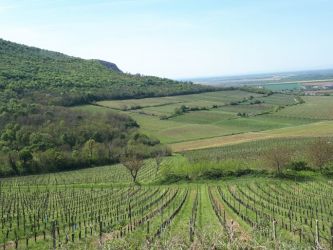More nutrients in the soil, more balanced moisture conditions, moderate erosion – these are the principal results of the research implemented at the University of Pécs. As part of the European Diverfarming project the researchers investigated the opportunities for diversification in vineyards and asparagus plantations.
For modern crop production monoculture is typical: at a given time only one crop grows in a plot. This practice has numerous negative impacts on the environment from rapid nutrient depletion of the soil to a general decline in biodiversity. With the collaboration of 25 research institutions and agricultural enterprises from eight countries the Horizon 2020 program of the European Union called Diverfarming was launched in 2017 with the purpose to find crop diversification solutions to these problems.
The project is coordinated by the Universidad Politécnica de Cartagena in Spain and has a budget of close to 10 million euros. From Hungary the University of Pécs and two agricultural enterprises joined the research team.
 The research in Hungary focused on woody crops: a vineyard owned by the Gere Attila Winery in Villány and an asparagus plantation of the Nedel Market Ltd. in Jakabszállás. Both crops are planted in rows relatively distant from each other. The scientists investigated the possible ecological effects of various intercrops seeded in the alleys. In the organic winery the alleys were sown with a grass mixture of seven species and yarrow, while in the more excessively fertilized asparagus field where pesticides are also applied they experimented with pea and oat for fodder.
The research in Hungary focused on woody crops: a vineyard owned by the Gere Attila Winery in Villány and an asparagus plantation of the Nedel Market Ltd. in Jakabszállás. Both crops are planted in rows relatively distant from each other. The scientists investigated the possible ecological effects of various intercrops seeded in the alleys. In the organic winery the alleys were sown with a grass mixture of seven species and yarrow, while in the more excessively fertilized asparagus field where pesticides are also applied they experimented with pea and oat for fodder.
The findings are promising in both areas.
”In Villány due to the vegetated surface water erosion was reduced, i.e. less soil was washed down the slope and the soil moisture budget became more equable. The tufted root system of the planted cover crops improved soil structure and aeration. This created better conditions for soil microbial activity: crop residues were more rapidly and more effectively decomposed and, thus, the soil was enriched in organic matter – in fact, nutrients” – summarizes Prof. Dr. Dénes, the project leader.
On the asparagus field with ridges at Jakabszállás the mitigation of the erosion problem was one of the results. In drought years like the present one the bare blown-sand soil is extremely exposed to wind erosion. Both intercrops tolerate drought well and also high nitrogen-binding capacity and, therefore, improved the nutrient supply of the soil. In addition, they reduced desiccation hazard and slowed down the leaching of nutrients.
The last General Assembly of the project was organized in Pécs with visits to the test areas. This offered a valuable occasion for the exchange of experience since the research involved studies from the Mediterranean to the northern boreal climate with diverse crops. For instance, crop rotations for cereals grown in arable fields as well as intercropping (similar to that applied in Hungary) in olive groves and melon fields.
The next task is to implant results into practice. The Hungarian experts have organized a series of local meetings for farmers in the Villány and Jakabszállás area to spread their findings and explain the benefits of the method.
”Promising consultations are underway with producers who are open to the implementation of intercropping” – said Dénes Lóczy. He added that the management observing ecological and sustainability aspects can prevent environmental damage which decrease crop yields are beneficial not only for the soil and its biota but also for the land owners.










